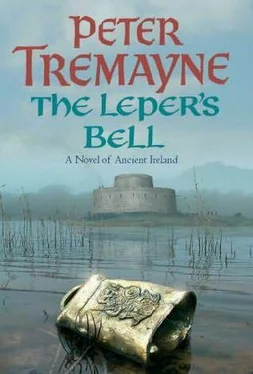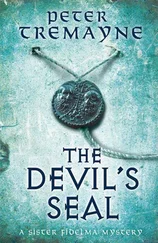Peter Tremayne - The Leper's bell
Здесь есть возможность читать онлайн «Peter Tremayne - The Leper's bell» весь текст электронной книги совершенно бесплатно (целиком полную версию без сокращений). В некоторых случаях можно слушать аудио, скачать через торрент в формате fb2 и присутствует краткое содержание. Жанр: Исторический детектив, на чешском языке. Описание произведения, (предисловие) а так же отзывы посетителей доступны на портале библиотеки ЛибКат.
- Название:The Leper's bell
- Автор:
- Жанр:
- Год:неизвестен
- ISBN:нет данных
- Рейтинг книги:4 / 5. Голосов: 1
-
Избранное:Добавить в избранное
- Отзывы:
-
Ваша оценка:
- 80
- 1
- 2
- 3
- 4
- 5
The Leper's bell: краткое содержание, описание и аннотация
Предлагаем к чтению аннотацию, описание, краткое содержание или предисловие (зависит от того, что написал сам автор книги «The Leper's bell»). Если вы не нашли необходимую информацию о книге — напишите в комментариях, мы постараемся отыскать её.
The Leper's bell — читать онлайн бесплатно полную книгу (весь текст) целиком
Ниже представлен текст книги, разбитый по страницам. Система сохранения места последней прочитанной страницы, позволяет с удобством читать онлайн бесплатно книгу «The Leper's bell», без необходимости каждый раз заново искать на чём Вы остановились. Поставьте закладку, и сможете в любой момент перейти на страницу, на которой закончили чтение.
Интервал:
Закладка:
Peter Tremayne
The Leper's Bell
… habebit vestimenta dissuta caput nudumos vesta contectum contaminatum ac sordidum se clamabit,
omnu tempore quo leprosus est et immundus solus extra castra.
And the leper in whom the plague is, his clothes shall be rent, and his head bare, and he shall put a covering upon his upper lip, and shall cry, Unclean, unclean.
As long as he has the infection he remains unclean. He must live alone: he must live outside the city.
Leviticus 13: 45-6Chapter One
Amist was rolling down from the upper reaches of the mountains, cascading like a silent smoky-white tide towards the lower slopes, silently shrouding everything in its swift forward motion. Strangely, there appeared to be no wind disturbing the noiseless air, but the mist must have been activated by some cold, soft breath to start its avalanche-like movement.
The hungry vapour reached and enshrouded Nessán the shepherd as he moved swiftly down the rocky incline, following alongside the path of the frothy river, which rose in the now invisible high peaks above him. As the chilly fingers of the mist swept over him, he halted for a moment to adjust to the sudden change in visibility. Although he was no stranger to these mountains, he was thankful for the guidance of the river at his right hand side, for he knew that it flowed down to the lowlands, north into the sea, and he would not get lost. It had been a foolish thing to do: to venture into these mountains when the changeable weather could not be taken for granted. Many people had paid with their lives for such folly.
Yet had he really been foolish to ascend the mountains in the first place? He shivered again, though this time not with cold. He had dared the climb, in spite of the condemnation of the New Faith, in order to make supplication to the old gods. He had told no one about his intention, not even his wife Muirgen, even though it was for her that he had taken such a dangerous step as to ignore the priests of Christ.
He had started his ascent of the mountains at dawn, climbing up by the foaming river and passing the lake, deep, black and still, in the speckled hollow. He had gone on up to the high ridges until he came to the spot where the river rose and then cascaded in a spectacular long waterfall as it began its descent through the lake and down the mountainside. This was the Top of the Three Hollows, Barr Tri gCom , where the ancients claimed that this world and the Otherworld met, where the fate of the five kingdoms had been decided by the gods.
Nessán the shepherd knew the stories well enough, for the old storytellers had passed them down to his people as they huddled round the flickering fires of their hearths. It was here that the sons of Milidh had fought with the ancient gods and goddesses of the Children of Danu and broken their power, driving them into the hills and relegating them from powerful deities to small, mischievous sprites. But before that had happened, on these same slopes, three goddesses of Danu — Banba, Fódhla and Eire — came to the sons of Milidh and each had made a plea, acknowledging the victory of the sons of Milidh, that their names be given to the land. So it came to pass. While poets often hailed the land of Banba and Fódhla, the ordinary people accepted that they lived in the land of Eire.
The slopes of these same mountains, according to the ancient storytellers, had been drenched with blood, for the victory of the sons of Milidh was not easily come by. Indeed, on these very slopes fell Scota, daughter of the pharaoh Nectanebus, wife to Milidh, and her druid Uar; Fas, wife to the great hero Uige, who became ruler of Connacht, also perished with her druid Eithiar, and there fell three hundred of the greatest warriors who had followed the sons of Milidh. But in contrast, or so the stories went, there perished ten thousand followers of the Children of Danu, before the battle was conceded to Milidh’s sons.
Indeed, these misty slopes had been fertilised by the ancient blood of the combatants. However, even that history was not the reason why these mountains were considered forbidding and often avoided by those who dwelt in their shadows.
It was said that in the time of Cormac the son of Art the Solitary, who was hailed as the 126th High King to rule at Tara, there was an attempt to invade the five kingdoms of Éireann by the army of Dáire Donn, who called himself King of the World. That formidable force landed on the very shores of the peninsula on which these same mountains rose. Cormac son of Art sent his great general, Fionn Mac Cumhail, and his élite warriors, the Fianna, to meet Dáire Donn. At a place called Fionntragha, the fair strand, by the shores of the sea, Fionn met the invaders and slaughtered every warrior of them.
Among the army was the daughter of Dáire Donn, a girl named Mis, who came upon her father’s body on the battlefield. She began to drink the blood of his wounds and thus demented fled into the mountains, which took their name Sliabh Mis from her. Here she dwelt in her blood frenzy, killing every animal and human that passed her way and drinking their blood.
It required great courage for Nessán to brave these bloodstained mountains, but he felt desperate and desperation can give valour even to the most timid.
So he had ascended to the black waterfall, and, as he had heard his ancestors had done in the centuries before the New Faith arrived on these shores, he had snared a rabbit to make a sacrifice and called upon Dub Essa, the dark lady of the waterfall, to grant his wish. But not by a single sign did he receive an answer. He waited, trying not to show impatience, but he had no wish to spend a night on the upper reaches of the mountain. All was quiet, and eventually he saw the smoky mist rolling in from the sea. After a moment more of indecision, he reluctantly left the waterfall and began to follow the river downwards. He was on the lower slopes when the mist suddenly came down and engulfed him.
He continued determinedly along the path, hearing the gushing sounds of the river close by, oddly muffled by the mist that encompassed him. Beyond the length of a fertach , some three metres, the mist obscured everything and he concentrated his gaze on the ground immediately at his feet.
He was descending now to the level path at the foot of the mountains which he would take to the left, away from the river, around the base of the mountains towards his home. He was feeling a sense of relief that he had left the brooding, shrouded peaks behind him.
A hand bell jangled with a high, strident note in the mist ahead of him. It was a sharp sound even though it was somewhat muffled in the gloom.
He halted nervously.
There was a shadow seated by the dark rising trunk of a tree a short distance ahead. He could just make out the form in the swirling mist.
The hand bell jangled again.
‘May the gods look down on you this day, Nessán the shepherd,’ came a high-pitched and curiously singsong voice, its quality not sounding quite human in the distortion of the murkiness.
Nessán screwed up his eyes to focus better, feeling the same chill as when the mist had first engulfed him.
‘Who speaks?’ he replied gruffly, trying to disguise his nervousness.
‘I speak,’ came the same voice, with what seemed a parody of a chuckle. The hand bell rang sharply again. ‘Salach! Salach!’ The words were an automatic cry as the shepherd moved closer.
Nessán took an involuntary pace backwards. ‘Are you a leper?’
He could not recognise the figure sitting at the bole of the tree because, from head to foot, it was covered in a hooded robe which did not reveal any features or show any flesh apart from one white — almost snow-white — claw that was the hand that held the small bell.
Читать дальшеИнтервал:
Закладка:
Похожие книги на «The Leper's bell»
Представляем Вашему вниманию похожие книги на «The Leper's bell» списком для выбора. Мы отобрали схожую по названию и смыслу литературу в надежде предоставить читателям больше вариантов отыскать новые, интересные, ещё непрочитанные произведения.
Обсуждение, отзывы о книге «The Leper's bell» и просто собственные мнения читателей. Оставьте ваши комментарии, напишите, что Вы думаете о произведении, его смысле или главных героях. Укажите что конкретно понравилось, а что нет, и почему Вы так считаете.











